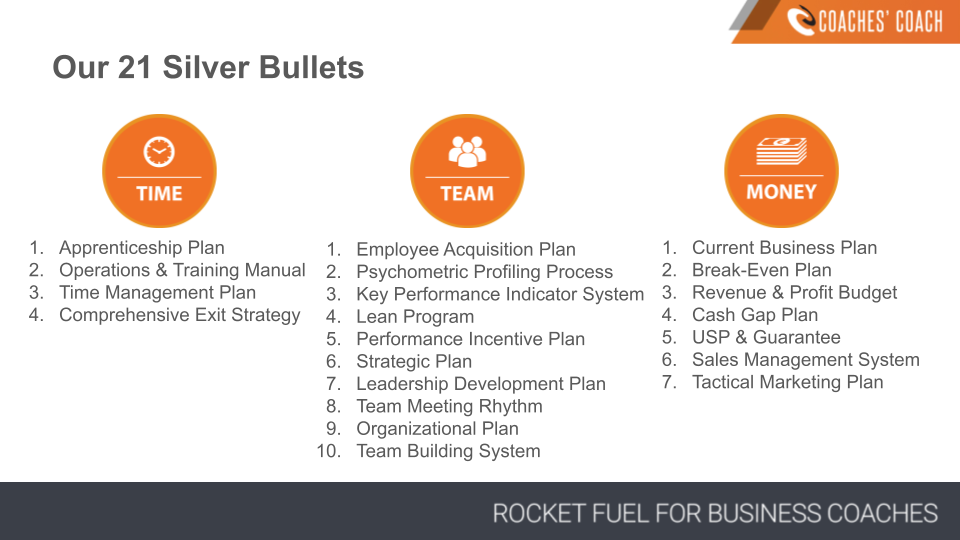
Three Great Fears Every Business Coach Must Conquer
So you want to be a business coach.
Of course you do! Business coaching is a rewarding, potentially very lucrative field that allows you to earn a great living while making a real difference in the lives of your business coaching clients (and the economy more generally!).
But if you’re like most beginning business coaches, you’re probably grappling with what I call the Three Great Fears—and they’re holding you back from building your practice as effectively and aggressively as you might otherwise do.
What are the Three Great Fears?
Service delivery: will I be able to deliver a valuable service that my clients will gladly pay me for?
Sales: will I be able to clearly articulate the value of my service in a sales meeting and establish the right expectations at the right price?
Lead generation: will I be able to consistently generate a list of people interested in my service, who want to talk to me and learn more about how I can help them?
(Sidenote: if these aren’t your fears, you’re worrying about the wrong things!)
Fortunately, there are simple and systematic ways to address each one. So let’s dive in.
Service Delivery
Having an amazing service offering is everything! Without it, and without absolute confidence in it, you’ll never have the courage to do what it takes to succeed…so you won’t.
Having an amazing service offering is everything! Without it, and without absolute confidence in it, you'll never have the courage to do what it takes to succeed...so you won't.
With an amazing service offering, it becomes easy to deliver value to clients that they will gladly pay good money for.
As business coaches, we solve three big problems that cause pain for business owners: Time, Team, and Money.
The Coaches’ Coach business coaching system is built around 21 “Silver Bullets” that are divided into each of these categories.

They enable you to help your clients address their most urgent business challenges with effective, proven strategies that work in any business. You introduce the silver bullet to your client, help them implement it, and help them recognize and quantify the impact.
As you do this week after week, you help your clients make incremental but impactful improvements in their businesses—and prove your value as their coach over and over again.
Sales
What’s the difference between a business coach who banks just $10,000 per year…versus one who does $10,000 per month?
Sales!
The single most valuable skill you will learn in business coaching is sitting down with a business owner, clearly articulating your value, and asking for money in a way that makes it a no-brainer for them.
Not coincidentally, this is the area where many coaches experience the most anxiety.
Only two things matter in sales: setting up sales meetings (a.k.a. Complimentary Coaching Sessions) and actually having the sales meetings so that you can convert them into clients at the end.
You can spend a lot of time on a lot of work that makes you feel “busy,” but ask yourself honestly: how much time in the past week have you really spent either setting up, or holding, Complimentary Coaching Sessions? If the answer isn’t, a lot, you’re going to struggle in this business.
Lead Generation
Which, of course, brings us to the third great fear—will I be able to consistently generate a list of people interested in my service, so that I can hold Complimentary Coaching Sessions, and convert those prospects into paying clients?
To be effective, you need to start with a defined target market. I usually suggest that you decide between two options: you can be a local legend (a coach who works with any kind of business owner within your geographical region) or a global guru (a coach who focuses on a single niche and uses primarily digital marketing tactics to build a global client base).
If you haven’t clearly defined your target market, it will be more difficult to attract clients. Be super clear about who you’re talking to. Then, master 2-3 of the following strategies:
- Referrals
- Networking
- Social media
- Content marketing
- Direct mail
- Outsourced telemarketing
- “Bold walking” (going into local places of business to introduce yourself)
- Strategic partnerships
Move contacts from strangers to leads to prospects to clients in a systematic way, and you’ll have an ongoing pipeline of new business.
For more fantastic strategies on building your business coaching practice, download our FREE ebook, Secrets of a Business Coaching Rock Star.




